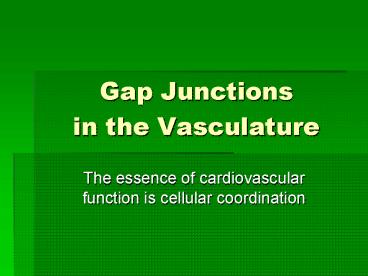Gap Junctions in the Vasculature - PowerPoint PPT Presentation
1 / 24
Title:
Gap Junctions in the Vasculature
Description:
Providing the pathway for the radial and longitudinal communication. Form a syncytium, the smooth muscle - endothelial cell unit. Vascular Gap Junction ... – PowerPoint PPT presentation
Number of Views:191
Avg rating:3.0/5.0
Title: Gap Junctions in the Vasculature
1
Gap Junctions in the Vasculature
- The essence of cardiovascular function is
cellular coordination
2
Pathway for cell-cell communication
- Autocrine and paracrine
- PG, ET, NO
- Gap junction
- Electric charge, small signaling molecules
3
Gap junction
- A functional gap junction
- 2 opposing hexamer (connexon, hemichannel)
- 6 connexin proteins
4
Vascular Gap Junction
- Role
- Uniting SM and endothelium
- Providing the pathway for the radial and
longitudinal communication - Form a syncytium, the smooth muscle - endothelial
cell unit
5
Vascular Gap Junction
- Research methods
- Specific and selective gap junction inhibitors
- Traditional inhibitors nonspecific
- Halothane, octanol, glycyrrhizic acid metabolites
- Gap-junctional blocking peptide
- Glycoconjugate a specific connexon blockade
- Cell-specific gap junction knockout mice
6
Vascular Gap Junction
- Electron microscopy
- Gap junctional plaque (endothelium)
- Dye movement between adjacent cells
- Electrical coupling
7
Myoendothelial junction (MEJ)
- Gap junction located at the smooth
muscle-endothelial cell interface
8
Myoendothelial junction (MEJ)
- Movement of current
- Movement of signaling molecule
- Ca2, IP3
9
Coupling between the smooth muscle and endothelium
- ?SMC Ca2?MEJ ? endothelial cell Ca2 ?
- Changes in SM membrane potential ?MEJ ? gating of
voltage-sensitive Ca2 channels in the
endothelial cell - EDHF ?MEJ ? electrical signal ?SM
10
(No Transcript)
11
MEJ
- In large vessel
- Absent, much less dense
- In resistance vessel
- More
12
MEJ
- In the smaller vessel
- One SMC can contact multiple EC
- One EC can contact multiple SMC
13
Cell-cell interactions in the vessel wall the
processs
- Gap junctions appear to provide important
pathways for communication - Along the vessel axis
- Longitudinal communication process
- Across the vessel axis
- Transverse signaling across the vessel wall
14
Longitudinal communication
- Patterns of the axially conducted electrical
response - Basic electrical cable theory
- A passive spread of current along the vessel
through gap junctions - Electrical stimulation and Ach induced responsese
- Spread over very long distances
- With little or no decay in magnitude
15
Heterocellular communication
- Endothelial cell-dependent agonist(Ach) ?signal
?move along the endothelium ?return to the
vascular SM ?initiate a vasomotor response
16
Connexin distribution
- In endothelium
- Cx37, Cx40, Cx43
- In smooth muscle
- Cx37, Cx40, Cx43, Cx45
17
Connexin
- Immunocytochemistry
- Western blot
18
Regulation of gap junctions
19
Regulation of gap junctions
- Connexin phosphorylation
- PKC, PKA, ?Ca2i, ? cAMP
- Gap junction internalization
- Gap junctions residence time
- Be recycled every 2-5 h
- GFs, cAMP, G proteins, extracellular matrix
proteins - Interaction along the connexins themselves
20
Vascular gap junctional communication is closely
linked to overall vascular physiology or
pathophysiology
- Cx40
- Be involved in the control of vasomotor tone
- Cx40 knockout mice hypertension
21
Vascular gap junctional communication is closely
linked to overall vascular physiology or
pathophysiology
- Cx43
- Endothelial cell-specific deletion of Cx43
hypotension - Upregulation of Cx43 in mouse aorta? ?formation
of atherosclerotic plaques
22
Vascular gap junctional communication is closely
linked to overall vascular physiology or
pathophysiology
- Vascular gap junctional communication is
essential to the coordination of cell
proliferation and migration during the
wound-repair process and angiogenesis
23
Summary
- Connexins play a central role in coordination of
cellular function in the vasculature - Localization, regulation of the vascular
connexins - Specific functions, the rules governing
expression ?
24
(No Transcript)































